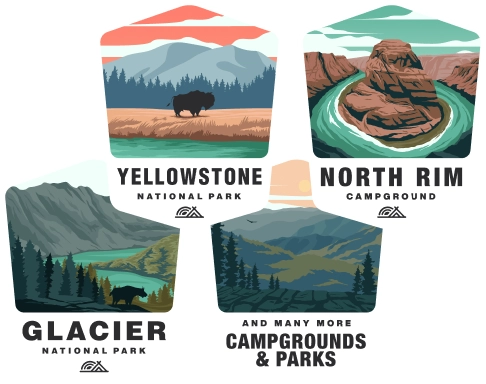Camping at Great Horned Owl
General Overview of Great Horned Owls
Great Horned Owls (Bubo virginianus) are one of the most widespread and adaptable owls in North America. They are notable for their distinctive horn-like feathered tufts, large eyes, and deep hooting voice. Predominantly nocturnal, they have excellent vision and hearing, which they use to hunt a wide variety of prey.
Great Horned Owl Habits and Behaviors in Deer Creek State Park
When camping at Deer Creek State Park, you may encounter Great Horned Owls, especially if your activities are during dusk or nighttime. While silent flyers, they can occasionally be heard:
- Calling: Their hooting call is a series of deep, stuttering hoots, often described as "hoo-h'HOO-hoo-hoo." They tend to call more during their breeding season, which is in late winter and early spring.
- Hunting: They prey on animals ranging from small rodents to other birds and even larger mammals like rabbits. They might also take fish from the lake.
- Nesting: These owls do not build their own nests but instead take over nests built by other large birds, or they may nest in tree cavities, cliff ledges, or even in deserted buildings.
Safety Tips for Campers Concerning Great Horned Owls
While Great Horned Owls are generally not a threat to humans, campers should be aware of the following:
- Do Not Disturb: If you find a nesting owl, keep a respectful distance to avoid stressing the birds. Disturbing an owl can lead to abandoning the nest.
- Securing Food: Keep all food items securely stored to avoid attracting rodents or other small animals that could, in turn, attract owls to your campsite.
- Pet Safety: If you're camping with small pets, do not leave them unattended, particularly at night, as they might be seen as potential prey by the owls.
- Watch Your Head: During nesting season, owls can become more territorial and could swoop down on perceived threats near their nest. Wear a hat and be observant of overhead movement in densely wooded areas.
Conservation and Respect for Wildlife
While camping in the park, it's essential to respect wildlife and their habitats:
- Observe Quietly: Use binoculars to watch Great Horned Owls from a distance.
- Leave No Trace: Follow "Leave No Trace" principles to reduce your impact on the natural environment and wildlife habitats.
- Wildlife Viewing Ethics: Respect the wildlife viewing guidelines set by the park, which protect both you and the animals.
Being aware of the presence of Great Horned Owls and respecting their natural behaviors will enrich your camping experience in Deer Creek State Park, while also ensuring the preservation of these majestic birds for future visitors to enjoy.
